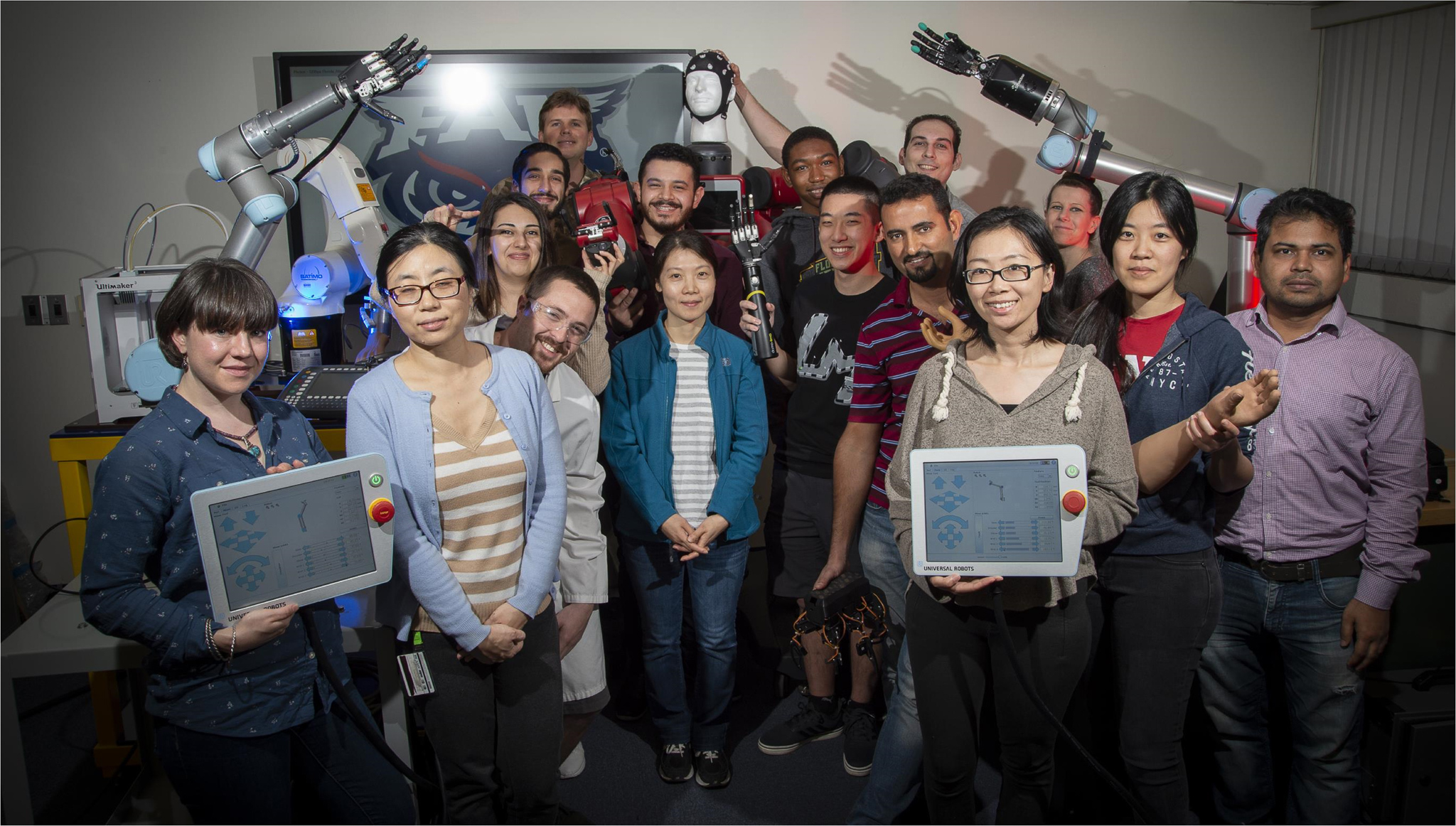FAU Team Led by Dr. Erik D. Engeberg Revolutionizes Neuroprosthetic Design with Biohybrid Robotic Hand Development
by Behnaz Ghoraani | Friday, Nov 22, 2024
Dr. Erik D. Engeberg, Professor in the Department of Ocean & Mechanical Engineering at Florida Atlantic University, and a team of scientists have recently published a groundbreaking study in neuroprosthetics. This publication marks a significant advancement in developing wearable robotic technologies designed to enhance the quality of life for individuals with disabilities. Since earning his Ph.D. in Mechanical Engineering from the University of Utah in 2008, Dr. Engeberg focused on robotics and prosthetics, mainly restoring lost touch sensation and motor control for upper limb amputees. This passion led him to establish the BioRobotics laboratory at FAU in 2014, where his innovative research pushes the boundaries of what's possible in bio-robotics.
The inspiration behind this latest publication stems from the profound challenges faced by individuals who have lost the use of their hands due to amputations, strokes, or spinal cord injuries. The inability to perform simple daily tasks or experience tactile sensations significantly impacts their quality of life. Motivated by these difficulties, Dr. Engeberg and his team developed a novel neurorobotic hand to explore effective practices for sensorimotor restoration.
Their research introduces a biohybrid robotic hand model that integrates live neural cultures with robotic systems, using neurons cultured in vitro—essentially creating a "brain in a dish." This model is linked with a robotic hand through a multichannel microelectrode array (MEA), allowing the team to study tactile sensation and sensorimotor control. The study investigates how different tactile encoding methods can influence the operation of an artificial hand, providing valuable insights that could revolutionize the design and functionality of assistive technologies such as prostheses and exoskeletons.
The project was led by Dr. Erik D. Engeberg, who was the senior corresponding author. Craig Ades, Ph.D., the first author of the study, focused on this project for his doctoral dissertation in Mechanical Engineering at FAU and now works at Guident in Boca Raton. This project received support from Moaed Abd, Ph.D., the second author, who contributed to the project as a graduate student in Mechanical Engineering at FAU and now works at Stellantis LLC Auburn Hills, Michigan. Douglas Hutchinson, M.D., an orthopedic surgeon and Professor at the University of Utah, served as the clinical collaborator. The team was further strengthened by the expertise of the late Emmanuelle Tognoli, Ph.D., a former Research Professor in the Center for Complex Systems and Brain Science, Sarah Du, Ph.D., an Associate Professor in the Department of Ocean & Mechanical Engineering specializing in microfluidic device development, and Jenny Wei, Ph.D., an Associate Professor in the Department of Biomedical Science with expertise in cell culture and neurodegenerative diseases research. This interdisciplinary group showcased a robust collaborative effort to tackle complex challenges in bioengineering and neuroscience.
The team's innovative methodologies are at the forefront of robotics, rehabilitation engineering, and neuroscience. They equipped a sophisticated robotic hand with sensors capable of detecting detailed pressure distributions, mimicking human touch. These sensors convert physical interactions into electrical stimuli that activate the cultured neurons, whose responses control the robotic hand's movements, thus closing the feedback loop in this advanced control system.
This research has demonstrated that it is possible for neurons in a dish to "feel" sensations through the robotic hand and respond accordingly. This discovery opens new possibilities for regenerative medicine, including the potential development of custom brain chips that could one day restore lost functionalities for disabled individuals. Beyond prosthetics, this research offers potential applications in disease monitoring and early prediction of sensorimotor impairments in conditions such as Parkinson's.
The publication has already received significant attention, achieving a high Altmetric score and ranking in the top 5% of all research outputs scored by Altmetric, thanks to effective dissemination efforts, including a well-coordinated press release by Gisele Galoustian. Looking ahead, Dr. Engeberg plans to integrate human participants into the feedback control loop and further refine the interaction between human users and robotic systems. His team is actively seeking additional funding from sources such as the NSF and NIH to continue this groundbreaking work.
Aligned with the Center for SMART Health at FAU, Dr. Engeberg's research advances the field of smart and hybrid prosthetics. It enhances our understanding of how such advanced technologies can be effectively utilized to improve health outcomes. Through his leadership and innovative research approach, Dr. Engeberg continues to be a driving force in neuroprosthetics and rehabilitation engineering.
Publication:
Ades, Craig, Moaed A. Abd, Douglas T. Hutchinson, Emmanuelle Tognoli, E. Du, Jianning Wei, and Erik D. Engeberg. "Biohybrid Robotic Hand to Investigate Tactile Encoding and Sensorimotor Integration." Biomimetics 9, no. 2 (2024): 78.